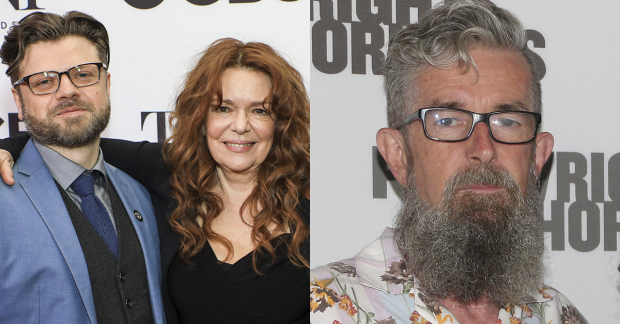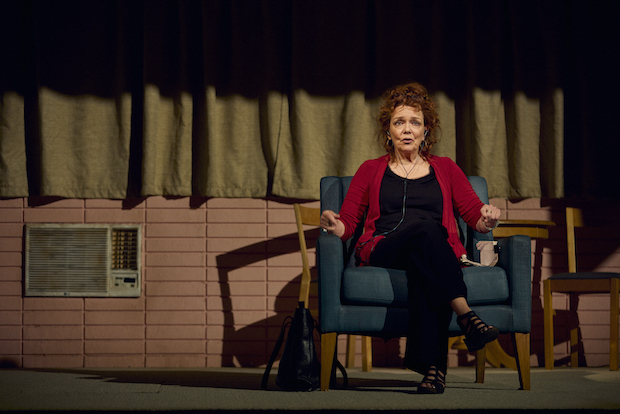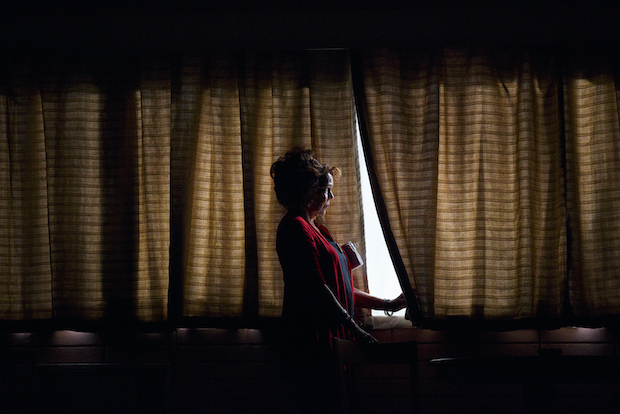Meet the Tony Nominees: Deirdre O'Connell, Les Waters, and Mikhail Fiksel on Building Dana H.
Lucas Hnath’s drama ran on Broadway last fall and led these three collaborators to their first nominations.
At the very start of Broadway's reopening season, Deirdre O'Connell took center stage at the Lyceum Theatre in Lucas Hnath's solo play, Dana H. On stage for pretty much all of this 80-minute drama, you didn't hear her own voice once. O'Connell lip-synced interviews with the playwright's mother, Dana Higgenbotham, a former prison chaplain who is kidnapped and taken on a journey by a white supremacist.
The unexpected Broadway run was the culmination of a long journey for the play: it premiered at the Ahmanson Theatre in Los Angeles, went to the Goodman in Chicago, and finally the Vineyard off-Broadway all before the pandemic. Though the Broadway engagement was relatively brief, it made an impact: O'Connell and her collaborators, director Les Waters and sound designer Mikhail Fiksel, all received Tony nominations this year; remarkably, given their extensive and acclaimed bodies of work, it's the first nomination for each of them.
Here, the trio looks back on the experience of building this piece from the ground up.

(© Tricia Baron/David Gordon)
This conversation has been condensed and edited for clarity.
How did you all get involved with Lucas and this play to begin with?
Les Waters: Lucas came to me five or six years ago and asked if I would interview Dana, and for a couple of reasons, I didn't want to do that. When I joined the production, I think you'd done one workshop in Chicago. Misha will know more than I.
Mikhail Fiksel: We did a week where the first version of the script emerged. In between that workshop and Les joining, I believe Lucas continued to edit, so by the time he came to you, it had gone through a couple iterations. The sense that I got was that there wasn't a certainty that this would be a lip-sync play. None of the people involved in the interview were told that. It was actually quite similar to what's happening right now: it was being recorded for archival purposes. They had a recorder sitting next to them, and it was a step above an iPhone.
Deirdre O'Connell: I came into it when they knew they were going to the Ahmanson and the Goodman. I don't know exactly where you were in the process, but there had been workshops, so they knew that a human could do it. But I didn't know a human could do it. And that this human could do that. I was on my own with the material for a couple of months trying to learn it. That was my job. Because I knew that I would have to know if I could do it way before we started rehearsal. I don't know exactly if there was an a-ha moment, but it gradually got easier. It felt like a new kind of brain-learning. By the time we started rehearsal, I could sit and do it.
Misha, when you first received the audio? What was it like, and how hard was it to put together?
Mikhail: It's an imperfect audio. What's fascinating is how often that became a strength and a dramatic device. We understood that all the artifacts of an imperfect recording are helping to sell the illusion of the lip-sync: the movement of the clothes, the random background noises, the creaking of the chair. All of that was elevating the storytelling. As sound designer, I had a lot of fun parsing that out and creating even more textures and musicality.
The editing was always a little unpredictable. Sometimes, a simple deletion or a small rearrangement was very easy, but sometimes, because of the audio, it would take a very long time to cut an entire section. It was like Jenga. You adjust one piece and then the whole thing begins to teeter in another direction. I appreciated everyone's patience, because sometimes I needed 45 minutes to chisel away at this thing.

(© Chad Batka)
Were there points in the process where you wish the real Dana Higginbotham had said things in a different way because you thought it would make a better dramatic beat for the storytelling?
Les: Probably. I don't remember them. It just seemed interesting to deal with the material that was in front of us. And surprising. She's not saying a line in the theater sense, but her attitudes on various things would take you by surprise. And I think that's great. It's not what you expect.
Deirdre: Not in terms of that. There were technical things, like, "If only she had said his name right there." She's assuming Steve knows who she's talking about because she's making a gesture. She ran the gamut, and we were so much trying to follow the lead of the thing and see what it was. We didn't know what it was, and didn't want to presume what it was, and that was the whole game. We aren't going to turn this into something that would please us; we're going to find out what it is. That's the bottom line of what Lucas decided to do as an exercise in relation to his mother. That's the thing that makes it so remarkable for me: I don't know if I could do that with my mother, with whom I have a very good relationship. But I was struck by what he was forcing himself to do.
Eventually this play will be done all around the world, non-professionally, professionally, and it will be up to other people to build it. What's the best piece of advice to each person that will be sitting in your seats?
Les: Don't add anything to the play if it's not required. The integrity has to be completely respected. It's deeply strange working on it now at Berkeley Rep, because I keep looking at Jordan Baker and saying, "Why is she speaking with Didi's voice?" Which is the same reaction I had when I met the real Dana. There's a jolt. Didi and Jordan are very different actors and people, but they're connected by this voice, and the attitudes of the voice remain the same wherever you are.
Deirdre: You will learn everything you need to know by following it, and it leads you. It takes a little while to trust that. You don't have time to get angry with yourself for screwing anything up, or to feel a wave of pride for getting anything right. The second you have those emotions, the brain goes out, and it's such a fast-moving thing to do. And it will feel like it's a different story being told from a different point of view every day. Her voice will sound different to you. I couldn't wake up in the morning and say, "I feel sad today, so I'm going to make Dana sad." The second I sat in the chair, it would happen. It wasn't something I had control over, which was so odd, but it was kind of great because you never are bored. Before I understood how it worked, I would ask Misha, like, "What did you do? Did you speed it up?" And he would say "No, that's in your mind," which was helpful, because then I didn't feel like I was losing my mind. You're also going to have to really take care of yourself. You're going to feel sad and alienated and scared.
Mikahil: It will sneak up on you how difficult this material is in the most surprising ways. You're not even going to register that you've been absorbing some atrocious stuff on repeat in very relentless way. So you have to take care of each other and take the time to support each other. Take breaks and acknowledge the things that you are feeling. We're doing this very technical and technology driven thing, but it is ultimately still a very human experience, and that comes with all the pain of being human.

(© Chad Batka)
What does it mean for you all to be recognized in this way, with your first Tony nominations all around?
Les: I feel quite joyous about it, and to be honest, I'm not a cheery person. I live at the top of a hill in Berkeley, and as I was walking down to work the other day and looking at the Bay, I thought "Oh, this is just great." And the fact that it's Didi and Misha, and there's a ton of people I know who've been nominated this year, particularly in design. It feels good, he said very seriously.
Deirdre: I second that emotion. We didn't have an inkling that this was something that could happen, but because the way the world had been shattered and was getting rebuilt, Broadway felt like the inevitable next step for this thing that we made. I was expecting that the audiences would not be the same as the tightly concentrated audiences I experienced at the Vineyard, where it was remarkable just being in a room where you knew that no one was breathing for an hour and a half, but they just got it immediately. You had 800 people in this state of concentration. On top of that, this experience from the beginning was one made for the purposes of love. That doesn't mean it was easy, but love was the only way you could make it. There was not a cynical moment. It was always just like "We have to do this." So this is just very validating.
Mikhail: There's a complicated relationship with all awards, but on this one, I didn't feel conflicted by any means. I love the work. I knew the work was good. We believed in it. So it felt both validating and a little life-affirming to get that recognition. This being my first nomination, I feel good about the way I've arrived at this work that we would have made anyway. We were committed to this thing, and it's fantastic that other people recognize that.










